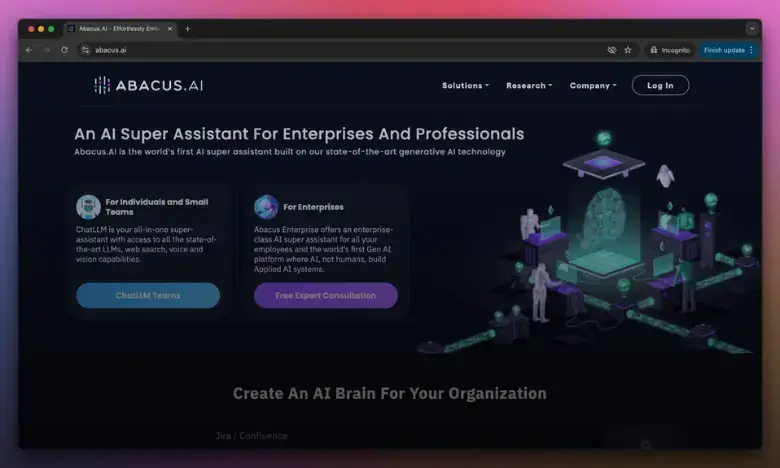Table of Contents
Introduction: Why Look for an Abacus AI Alternative?
Artificial Intelligence platforms have become essential for businesses of all sizes. Abacus AI is well-regarded for simplifying machine learning workflows, but it’s not always the perfect fit for every use case. Some organizations seek more flexibility, others want transparent pricing, while many simply require deeper integration with their existing infrastructure. That’s why exploring an abacus ai alternative can be a game-changer, offering options that align better with unique technical and business needs.
1. Apollo.io – Sales Intelligence Meets AI
Apollo.io provides a different approach for teams that rely heavily on customer intelligence. While it isn’t a core machine learning development suite, it’s often considered by organizations searching for an abacus ai alternative that prioritizes lead generation, engagement, and predictive outreach. Its massive database, combined with workflow automation, allows sales and marketing teams to harness AI without deep coding skills.
2. Google Vertex AI – Cloud-Native ML Powerhouse
For enterprises running workloads on Google Cloud, Vertex AI offers an integrated environment for building, training, and deploying ML models. Many companies looking for an abacus ai alternative turn to Vertex AI because of its seamless AutoML capabilities, tight integration with BigQuery, and scalable infrastructure. It allows teams to focus more on experimentation and less on managing complex pipelines manually.
3. H2O.ai – Open Source with Enterprise Muscle
Open-source enthusiasts often turn to H2O.ai when searching for an abacus ai alternative. It combines the power of AutoML with explainability tools such as SHAP and LIME, giving teams full visibility into how models make decisions. This transparency makes it especially valuable for regulated industries like finance and healthcare, where compliance is non-negotiable.
4. Amazon SageMaker – Full-Stack ML in AWS
Amazon SageMaker remains a go-to solution for organizations already committed to AWS. It provides everything from model training environments to real-time inference at scale. For those evaluating an abacus ai alternative, SageMaker’s appeal lies in its ecosystem—seamless access to AWS services, pre-trained models from the marketplace, and automated deployment options that reduce operational complexity.
5. KNIME – Open-Source Analytics Platform
KNIME stands out for its simplicity and drag-and-drop interface, making it one of the most accessible options for analytics-driven AI adoption. Many small and medium businesses prefer this tool as an abacus ai alternative because it doesn’t require extensive coding skills. Teams can build end-to-end workflows, integrate Python or R scripts when needed, and still maintain a visual overview of their data pipelines.
6. UbiOps – Scalable Deployment for AI Models
Not every team needs a full AI lifecycle platform—some already have models but struggle with deployment. UbiOps answers this gap, and that’s why it is often evaluated as an abacus ai alternative. Its strength lies in fast, scalable deployments without requiring teams to manage infrastructure manually. This makes it attractive for startups that prioritize agility and cost-efficiency.

7. DataRobot – AI Automation at Scale
DataRobot is designed for enterprises that want automation, governance, and scalability in one platform. It has strong compliance features, advanced monitoring, and governance dashboards. Large organizations often position it as an abacus ai alternative because of its enterprise-readiness and the ability to integrate with existing IT systems. For teams where explainability and compliance are critical, DataRobot brings unmatched value.
Real-World Use Cases of Abacus AI Alternatives
A financial services company recently shifted from Abacus AI to H2O.ai because it needed full transparency in its credit risk models. Meanwhile, a healthcare provider selected Vertex AI as an abacus ai alternative, allowing seamless integration with Google’s secure cloud infrastructure. These examples highlight how different industries prioritize different needs—whether it’s compliance, scale, or user-friendliness.
Feature Comparison and Buyer’s Guide
When comparing AI platforms, it’s important to consider deployment options, pricing models, and the level of support for AutoML. For instance, organizations already in AWS naturally lean toward SageMaker, while open-source supporters value KNIME and H2O.ai. Companies emphasizing deployment speed may prefer UbiOps, which has become a rising choice as an abacus ai alternative among agile startups.
Conclusion: Picking the Right Alternative
Selecting the right platform depends on your organization’s scale, budget, and technical expertise. Whether it’s Apollo.io for sales intelligence, Vertex AI for cloud-native ML, or DataRobot for enterprise automation, the key is to align features with your core goals. Businesses that carefully evaluate an abacus ai alternative often discover better customization, improved compliance, and more cost-effective AI adoption.

